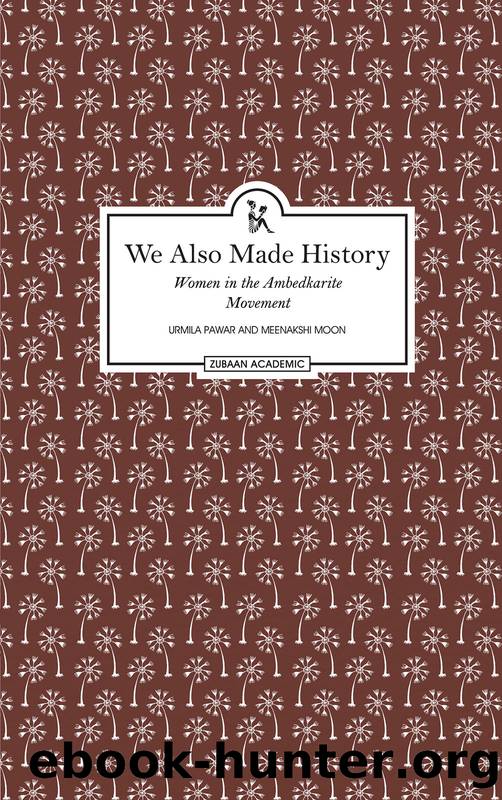We Also Made History by Urmila Pawar and Meenakshi Moon

Author:Urmila Pawar and Meenakshi Moon
Language: eng
Format: epub
Publisher: Zubaan, an imprint of Kali for Women
Published: 2020-03-13T00:00:00+00:00
** Translatorâs note: In serving meals to large numbers of guests to observe the end of the period of full mourning.
12
Victory of the Dhamma
It is said with reference to the issue of temple entry by untouchables that all three temple-entry satyagrahas (the Ambadevi temple entry at Amaravati, the Parvati temple entry in Pune and the Kalaram Temple entry in Nashik) were unsuccessful. This may be a historical fact strictly speaking, but from the viewpoint of the social sciences the temple entry movement was a social and religious revolution.
As a result of these constant struggles it became apparent that the untouchablesâ solidarity, organisation and the participation of women contained an immense strength. Among the untouchables, since every caste and sub-caste had its own unique way of seeing itself, these differences became clear. The true nature of the newspapers and the social reformers who called themselves progressive and egalitarian became apparant. Most importantly, the bitterness about untouchables in the minds of caste Hindus and the position of untouchables in Hinduism now stood exposed to the world. The overall effect of this was much more important than the actual matter of temple entry, and it pointed the way for the liberation of the untouchables.
On the evening of 13th October 1935, in Yeole Dr. Babasaheb Ambedkar announced his decision to change his religion. About ten thousand men and women were present at this meeting. The welcome committee was headed bv Amrutrao Rankhambe.
All over the country there were varied reactions to this announcement on conversion. Mahatma Gandhi gave the first reaction from Wardha on 15th October. He said, âReligion is not a house or a piece of clothing that one may cast off at will. It is not a part of the body; it is a sign of the soul. â To this reaction Babasaheb replied, âInequality is the basis of Hinduism and to deny the backward people the opportunity to develop the humanity inherent in them is the morality of this religion. If the religion of our ancestors gives us no means to train ourselves for righteous behaviour and does not inspire us, why should we remain in that faith?â
Babasaheb went on to say, âThe untouchables spent all their strength to attain the simple rights of citizenship and to gain equality in the social, religious, economic and political spheres. But all their efforts, strength and sacrifice were wasted. If the untouchables give up the Hindu faith as the last resort, the question of fighting with the Hindus will cease to arise. It is because we are Hindus that we have to live life under the shadow of insult. That is why I declare that although I was born a Hindu I will not die a Hindu.â
The impact of the announcement of conversion was felt far and wide. Meetings of dalits were held at district and tehsil levels. Dalit women attended these meetings in large numbers and they were given an opportunity to speak from the stage. What is even more important, women organised their own conferences to give their support to the call for conversion.
Download
This site does not store any files on its server. We only index and link to content provided by other sites. Please contact the content providers to delete copyright contents if any and email us, we'll remove relevant links or contents immediately.
| Africa | Americas |
| Arctic & Antarctica | Asia |
| Australia & Oceania | Europe |
| Middle East | Russia |
| United States | World |
| Ancient Civilizations | Military |
| Historical Study & Educational Resources |
The Third Pole by Mark Synnott(952)
Money for Nothing by Thomas Levenson(947)
The Economist (20210109) by calibre(937)
Christian Ethics by Wilkens Steve;(860)
Made in China by Anna Qu(854)
The Age of Louis XIV: The Story of Civilization by Will Durant(830)
Nonstate Warfare by Stephen Biddle(813)
Reopening Muslim Minds by Mustafa Akyol(812)
100 Posters That Changed The World by Salter Colin T.;(783)
Culture by Terry Eagleton(776)
The Shortest History of China by Linda Jaivin(776)
The Great Pyramid Void Enigma by Scott Creighton(760)
The Irish Buddhist by Alicia Turner(759)
Ideology by Eagleton Terry;(743)
Routledge Handbook of Contemporary India by Knut A. Jacobsen(739)
Sybille Bedford by Selina Hastings(688)
The Jews of Silence: A Personal Report on Soviet Jewry by Elie Wiesel(687)
Banaras: CITY OF LIGHT by Diana L. Eck(678)
Objects of Vision by Saab A. Joan;(670)
